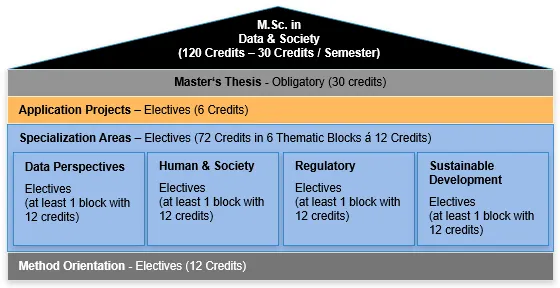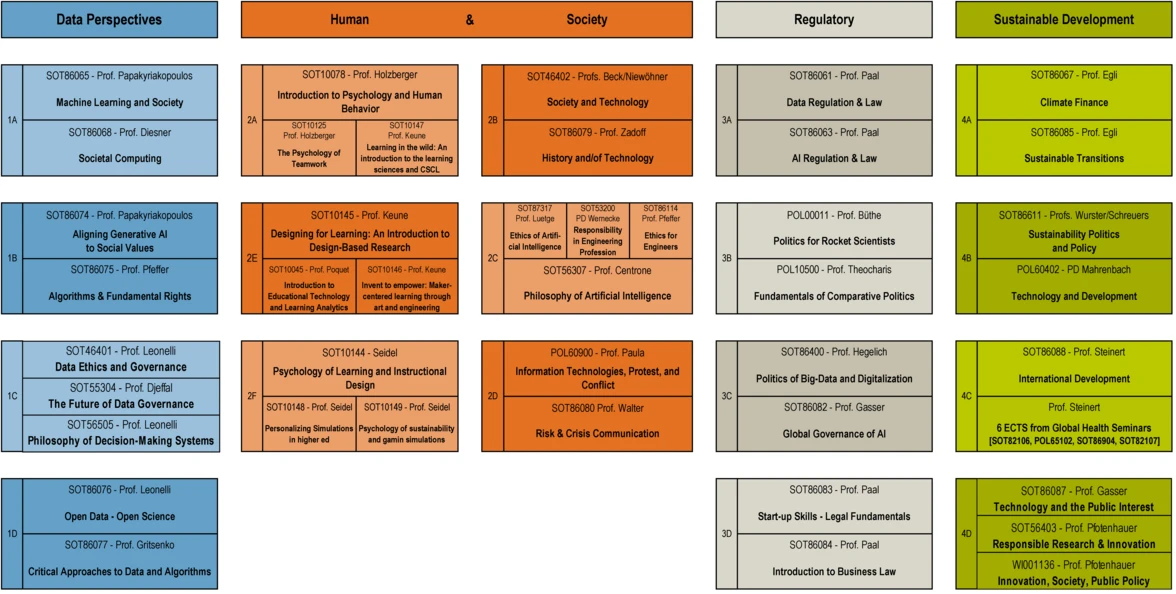Data & Society
New M.Sc. Program • Plug-In Modules • Certificates
Summary
- Engineering education of the future: “Transfer of scientific findings into societal value creation will take place across disciplines”.
- TUM as a hub for Human Centered Engineering.
- Additional „21st Century Skills“-offer for TUM students.
- Solution-oriented interdisciplinary tackling of the "grand societal challenges“.
- Characterized by a positive vision of the future.
-
Levels of data and technology-oriented applications: Human + Society + Planet.
M.Sc. Data & Society - Overview
The “Data & Society” degree program is exclusively for students with a STEM Bachelor degree who have an interest in social contexts at the interface of technologies with people and society and offers students the opportunity to create added value for society by applying technical skills with a view to social needs and sustainable processes. This exciting program is designed to equip you with the skills and knowledge necessary to navigate and influence the rapidly evolving engineering landscape.

The program is flexible and stackable. At least 90 credits must be earned in elective modules. Of these, at least 12 credits must be earned in the elective area of "Method Orientation", at least 72 credits in the elective area of areas of "Specialization" and at least 6 credits in the elective area of "Application Project". In the elective area of specialization, elective modules from a total of six thematically related module blocks of 12 credits each must be completed, whereby at least one thematically related module block of at least 12 credits must be completed from each of the four specialization areas "Data Perspectives", "Human & Society", "Regulatory" and "Sustainable Development".
„More information for currently enrolled students can be found here."
Specialization Areas - Thematic Blocks - Modules
The specialization courses in the Teaching Area "Data & Society" are organized in thematic blocks of 12 credits. You are free to take any course in the program as plug-in module for any TUM study program. However, if you are studying the M.Sc. "Data & Society" or your goal is to receive a certificate (see below), you have to finish blocks.
Info: Courses are 6 ECTS (broad cells in the table) or 3 ECTS (narrow cells). Some blocks include more than 12 ECTS - then you can choose which courses you take to reach at least 12 ECTS to fulfill the block.
Certificates
A certificate can be obtained in each of the four specialization areas "Data Perspectives", "Human & Society", "Regulatory" and "Sustainable Development". A certificate for the respective area of specialization is awarded for proof of modules totaling at least 24 credits from completed thematic module blocks (12 credits each). Certificates are primarily intended for students who complete several modules in the areas of specialization without being enrolled in the Master's program "Data & Society". Certification is granted upon request to the Examination Board.
Info “Human & Society”: In case at least 24 credits are accomplished in the “Human” or the “Society” sub-area, a certification “Human Behavior" or “Technology and Society” can be granted.
Application to the M.Sc. Program
Applicants to the Master's program in Data & Society at the Technical University of Munich must hold a completed Bachelor's degree. Additionally, they need to complete the following steps:
- Motivation Letter: Submit a written motivation letter of up to 150 words explaining why you have chosen the Data & Society program at TUM. Highlight your fit for the program and provide examples, such as relevant internships, study-abroad experiences, or any professional or academic training demonstrating your qualifications for this field.
- Interview: Selected applicants will be invited to an interview. The interview will last between 20 and 30 minutes in English. It will cover your motivation for applying, your academic background in MINT (STEM) fields, and your ability to work scientifically and methodically. You will also be asked about your understanding of societal dynamics and global developments concerning technological innovations.
All information related to application and admission can be found here.
Offered Modules
Data Perspectives
The focus of this elective area is on the critical examination of data and algorithms in the context of people and society. The modules in this elective area deal with the bias and fairness of data and algorithms as well as their societal implications and effects on fundamental rights. Other topics include the governance and availability of data.
MASCHINE LEARNING AND SOCIETY
3 ECTS: SOT86066 • 6 ECTS: SOT86065 • Prof. Dr. Orestis Papakyriakopoulos (Societal Computing)
SOCIETAL COMPUTING
6 ECTS: SOT86068 • Prof. Dr. Jana Diesner (Human-Centered Computing)
ALIGNING GENERATIVE AI TO SOCIAL VALUES
3 ECTS: SOT86097 • 6 ECTS: SOT86074 • Prof. Dr. Orestis Papakyriakopoulos (Societal Computing)
ALGORITHMS & FUNDAMENTAL RIGHTS
6 ECTS: SOT86075 • Prof. Dr. Jürgen Pfeffer (Computational Social Science)
DATA ETHICS AND GOVERNANCE
6 ECTS: SOT46401 • Prof. Dr. Sabina Leonelli (Philosophy and History of Science and Technology)
THE FUTURE OF DATA GOVERNANCE
6 ECTS: SOT55304 • Prof. Dr. Christian Djeffal (Law, Innovation and Legal Design)
PHILOSOPHY OF DECISION-MAKING SYSTEMS
6 ECTS: SOT56505 • Prof. Dr. Sabina Leonelli (Philosophy and History of Science and Technology)
OPEN DATA - OPEN SCIENCE
3 ECTS: SOT53406 • 6 ECTS: SOT86076 • Prof. Dr. Sabina Leonelli (Philosophy and History of Science and Technology)
CRITICAL APPROACHES TO DATA AND ALGORITHMS
6 ECTS: SOT86077 • Prof. Dr. Daria Gritsenko (Algorithmic Governance and Public Policy)
Human & Society
This elective area contains modules that aim to introduce STEM-focused students to the fundamentals of human behavior and social issues. These include the historical and current interplay between humans and technology, their philosophical and ethical dimensions, as well as topics in the context of conflict and crises.
INTRODUCTION TO PSYCHOLOGY AND HUMAN BEHAVIOR
3 ECTS: SOT10069 • 6 ECTS: SOT10078 • Prof. Dr. Doris Holzberger (Psychology of Teaching and Learning)
THE PSYCHOLOGY OF TEAMWORK
3 ECTS: SOT10125 • Prof. Dr. Doris Holzberger (Psychology of Teaching and Learning)
LEARNING IN THE WILD: AN INTRODUCTION TO THE LEARNING SCIENCES AND CSCL
3 ECTS: SOT10147 (Starting SoSe 2026) • Prof. Dr. Keune (Learning Sciences and Educational Design Technologies)
DESIGNING FOR LEARNING: AN INTRODUCTION TO DESIGN-BASED RESEARCH
6 ECTS: SOT10145 • Prof. Dr. Keune (Learning Sciences and Educational Design Technologies)
INTRODUCTION TO EDUCATIONAL TECHNOLOGY AND LEARNING ANALYTICS
3 ECTS: SOT10045 • Prof. Dr. Poquet (Learning Analytics)
INVENT TO EMPOWER: MAKER-CENTERED LEARNING THROUGH ART AND ENGINEERING
3 ECTS: SOT10146• Prof. Dr. Keune (Learning Sciences and Educational Design Technologies)
PSYCHOLOGY OF LEARNING AND INSTRUCTIONAL DESIGN
6 ECTS: SOT10144 • Prof. Dr. Tina Seidel (Educational Psychology)
PERSONALIZING SIMULATIONS IN HIGHER ED
3 ECTS: SOT10148 (Starting SoSe 2026) • Prof. Dr. Tina Seidel (Educational Psychology)
PSYCHOLOGY OF SUSTAINABILITY AND GAMIN SIMULATIONS
3 ECTS: SOT10149 (Starting SoSe 2026) • Prof. Dr. Tina Seidel (Educational Psychology)
SOCIETY AND TECHNOLOGY
6 ECTS: SOT46402 • Prof. Dr. Beck (Sociology of Science and Technology) and Prof. Dr. Niewöhner (Anthropology of Science & Technology)
HISTORY AND/OF TECHNOLOGY
6 ECTS: SOT86079 • Dr. Mirjam Zadoff
ETHICS IN ARTIFICIAL INTELLIGENCE
3 ECTS: SOT87317 • Prof. Dr. Christoph Lütge (Business Ethics)
RESPONSIBILITY IN THE ENGINEERING PROFESSION. APPLIED ETHICS FOR ENGINEERS
3 ECTS: SOT53200 • Dr. Jörg Wenecke (Philosophy of Science)
ETHICS OF ENGINEERS
3 ECTS: SOT86114 • Prof. Dr. Jürgen Pfeffer (Computational Social Science)
PHILOSOPHY OF ARTIFICIAL INTELLIGENCE: KEY READINGS
6 ECTS: SOT56307 • Prof. Dr. Stefania Centrone (Philosophy of Science)
APPLIED PHILOSOPHY OF QUANTUM THEORY
6 ECTS: SOT56401 • Prof. Dr. Stefania Centrone (Philosophy of Science)
INFORMATION TECHNOLOGIES, PROTEST, AND CONFLICT
6 ECTS: POL60900 • Prof. Dr. Katrin Paula (Global Security and Technology)
RISK & CRISIS COMMUNICATION
3 ECTS: SOT86102• 6 ECTS: SOT86080 • Dr. Stefanie Walter (Media Portrayal of Majority and Minority Group)
Regulatory
This elective area includes modules from the fields of law and politics at the interface with technology. The focus here will be on the regulation and governance of technologies, data and AI at national, EU and global level.
DATA REGULATION & LAW
3 ECTS: SOT86060 • 6 ECTS: SOT86061 • Prof. Dr. Boris Paal (Law and Regulation of the Digital Transformation)
AI REGULATION & LAW
3 ECTS: SOT86062 • 6 ECTS: SOT86063 • Prof. Dr. Boris Paal (Law and Regulation of the Digital Transformation)
POLITICS FOR ROCKET SCIENTISTS:
AN INTRODUCTION TO POLITICAL SCIENCE FOR NON-POLITICAL SCIENTISTS
6 ECTS: POL00011 • Prof. Dr. Tim Büthe (International Relations)
FUNDAMENTALS OF COMPARATIVE POLITICS
6 ECTS: POL10500 • Prof. Dr. Yannis Theocharis (Digital Governance)
POLITICS OF BIG-DATA AND DIGITALIZATION
6 ECTS: SOT86400 • Prof. Dr. Simon Hegelich (Political Data Science)
GLOBAL GOVERNANCE OF AI
6 ECTS: SOT86082 • Prof. Dr. Urs Gasser (Public Policy, Governance and Innovative Technology)
START-UP SKILLS - LEGAL FUNDAMENTALS
6 ECTS: SOT86083 • Prof. Dr. Boris Paal (Law and Regulation of the Digital Transformation)
INTRODUCTION TO BUSINESS LAW
6 ECTS: SOT86084 • Prof. Dr. Boris Paal (Law and Regulation of the Digital Transformation)
GLOBAL GOVERNANCE OF AI
6 ECTS: SOT86082 • Prof. Dr. Urs Gasser (Public Policy, Governance and Innovative Technology)
Sustainable Development
In the Sustainable Development elective area, the focus is on the global development of the planet. The individual modules focus on sustainable technologies on the one hand and on local (public interest) and international (global development) issues on the other.
CLIMATE FINANCE
6 ECTS: SOT86067 • Prof. Dr. Florian Egli (Public Policy for the Green Transition)
SUSTAINABLE TRANSITIONS
6 ECTS: SOT86085 • Prof. Dr. Florian Egli (Public Policy for the Green Transition)
SUSTAINABILITY POLITICS AND POLICY
6 ECTS: SOT86611 • Prof. Dr. Miranda Schreuers (Environmental and Climate Policy) & Prof. Dr. Stefan Wurster (Policy Analysis)
TECHNOLOGY AND DEVELOPMENT
6 ECTS: POL60402 • Dr. Laura Mahrenbach (Comuptational Social Science)
INTERNATIONAL DEVELOPMENT
6 ECTS: SOT86088 • Prof. Dr. Janina Steinert (Global Health)
INTRODUCTION TO GLOBAL HEALTH
3 ECTS: SOT82106 • Prof. Dr. Janina Steinert (Global Health)
GENDER DISPARITIES IN HEALTH AND DEVELOPMENT
3 ECTS: SOT82107 • Prof. Dr. Janina Steinert (Global Health)
TECHNOLOGY AND THE PUBLIC INTEREST
6 ECTS: SOT86087 • Prof. Dr. Urs Gasser (Public Policy, Governance and Innovative Technology)
RESPONSIBLE RESEARCH & INNOVATION
6 ECTS: SOT56403 • Prof. Dr. Pfotenhauer (Innovation, Society & Public Policy)
Method Orientation
In this area, we enable students from a wide range of B.Sc. backgrounds to expand their methodological knowledge. Since most STEM B.Sc. degree program have a sound mathematical and method-oriented education, students will also learn how to apply this knowledge to study social and societal challenges.
ADVANCED METHODS FOR MEASUREMENT AND MODELING OF CHOICE BEHAVIOR
6 ECTS: SOT86608 • Prof. Dr. Allister Loder (Mobiliy Policy)
ANALYZING TEXT DATA: FROM BASICS TO ADVANCED TECHNIQUES
6 ECTS: SOT86069 • Prof. Dr. Jürgen Pfeffer (Computational Social Science)
PROGRAMMING FOR NON-COMPUTER SCIENTISTS
6 ECTS (POL20100) • Prof. Dr. Jürgen Pfeffer (Computational Social Science)
ADVANCED COMPUTATIONAL METHODS
6 ECTS: SOT86050 • Prof. Dr. Jürgen Pfeffer (Computational Social Science)
METHODS OF SOCIAL NETWORK ANALYSIS
6 ECTS: SOT86055 • Prof. Dr. Jürgen Pfeffer (Computational Social Science)
QUALITATIVE METHODS
6 ECTS: SOT86402 • Prof. Dr. Eugénia da Conceição-Heldt (European and Global Governance)
MIXED METHODS
6 ECTS: SOT86112 • Prof. Dr. Daria Grintsenko (Algorithmic Governance and Public Policy)
Application Project
The practical modules focus on the ability to develop interface skills between technology and society. Students apply a combination of technical and social knowledge in project collaborations with private companies, public administration and national and international institutions.
APPLICATION PROJECT: PUBLIC SECTOR
6 ECTS: SOT86072 • Prof. Dr. Jürgen Pfeffer (Computational Social Science)
APPLICATION PROJECT: TECH POLICY PRACTICE
6 ECTS: SOT86071 • Prof. Dr. Urs Gasser (Public Policy, Governance and Innovative Technology)
APPLICATION PROJECT: PRIVATE SECTOR
6 ECTS: SOT86073 • Prof. Dr. Orestis Papakyriakopoulos (Societal Computing)
Contact
For all questions realted to individual classes, please contact the respective lecturerer. For all questions related to the M.Sc. Data & Society or the Certificates, please reach out to: ds(at)sot.tum.de.
